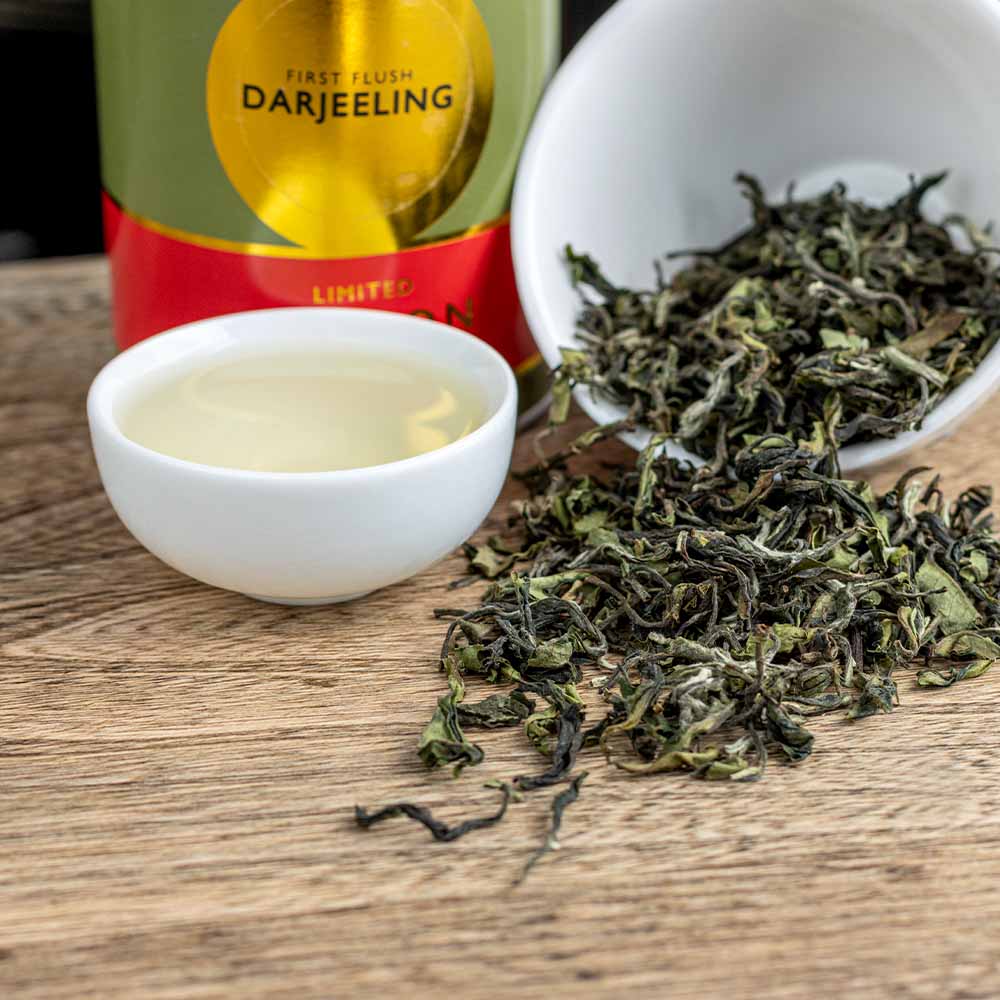Home / Loose Leaf Tea / Black Tea
Couldn't load pickup availability
A bright, fresh tea plucked during the April Buddha Jayanti full moon.
Grown and crafted by the Small Growers Cooperative - a group of 60 families working together to control their own destiny, and produce some of the best tea in the world.
Tasting Notes
Tasting Notes
This Himalayan tea is an early pluck, straight after the dormant winter, rich in stored sweetness. Highly fragrant and floral it is light and elegant as a green tea whilst combining the satisfying malty, chocolate notes that will be more pronounced in the Second Flush. Best enjoyed without milk.
Origin
Origin
Mirik Valley, Darjeeling, India
Cost Per Cup
Cost Per Cup
Share



Recommended Infusion Guide
-

Quantity
Use 2.5g of tea per 150ml of water.
-

Temperature
For the optimum infusion use 80°C water.
-

Time
Infuse for 90 seconds, tasting regularly.
-

Infusions
You can infuse this tea at least three times. With each careful infusion, different subtleties of flavour are revealed.
-

Quantity
Use 0.1 oz of leaf per 5.5 fl oz of water.
-

Temperature
For the optimum infusion use 176°F water.
-

Time
Infuse for 90 seconds, tasting regularly.
-

Infusions
You can infuse this tea at least three times. With each careful infusion, different subtleties of flavour are revealed.
-

Quantity
Use 1 level tbsp. per 150ml of water.
-

Temperature
For the optimum infusion use 80°C water.
-

Time
Infuse for 90 seconds, tasting regularly.
-

Infusions
You can infuse this tea at least three times. With each careful infusion, different subtleties of flavour are revealed.
More infusion tips
How to infuse your tea is very personal, and these are just our recommendations based on experience. Please experiment with these variables to your heart's delight. These are our recommendations, not hard and fast rules. The most delicious tea is the one you love.
Our guide uses a standard tea cup size (150ml/5.5 oz) as a measure, please adjust the quantity of leaf accordingly for less or more water. Our whole loose leaves are of such a high quality that you can infuse our teas at least twice, and the second infusion is often better than the first, with different flavours revealed as the leaf softens. If you prefer your tea stronger, add more leaf, don’t leave it for longer (this will just make it bitter).

Buddha Jayanti full moon
This Darjeeling first flush tea was plucked during a 2023 Buddha Jayanti full moon.
The Small Growers Society use traditional farming methods without any chemical pesticides and herbicides. Even before the popularity of organic tea, the land was kept untouched by chemicals, in part due to the high costs, and an unwillingness to become dependent on products they could not produce themselves.
Many varieties of herbs, fruits and vegetables are grown alongside the teas to ensure rich biodiversity.

An independent cooperative
This loose leaf tea comes from a community of 60 independent families working together within the specially designated region of Darjeeling. The cooperative is nurtured by the pioneering organic tea farmer Rajah Banerjee. They work under truly organic and regenerative principles
Before the cooperative the growers had no direct route to market and so their leaves were sold to larger tea companies. They had no control over the price they would be paid nor the end quality of the tea.
By purchasing their own tea processing equipment they now have control over the end product, allowing them to craft higher quality loose leaf Darjeeling tea and retain the value of their leaves and craft.

SMALL TEA GROWERS SOCIETY
Yanki & Allan Rai
The Small Tea Growers Society was founded by Yankhu Tamang (Yanki) & her son Allan Rai.
Yanki founded the society to look after her fellow local tea farmers and not be forced to supply giant agribusiness who showed no concern for the local community or the land.
Her son Allan Rai is an experimental tea maker who focuses on the crafting of their precious leaf into truly extraordinary tea.
Darjeeling is an area high in the Eastern Himalayas with Nepal to the West, Bhutan to the east, Sikkim to the north and tibet and West Bengal to the south.
Bunkulung village in the Mirik valley is a secret, hidden jewel on the western edge of Darjeeling. It is thought to be one of the first places tea was cultivated in India in the 1840s. This magnificent, unspoilt terroir is surrounded by subalpine forests, orange groves and sits above the Balason river basin.
The Small Growers Society is spread across the valley ranging from 1000 to 1980m elevation above Mirik Lake.
Shipping, delivery & more...
Australia Shipping Information
Australia Tracked Delivery from AU$20.00
FREE International Tracked Delivery when you spend AU$125 or more
International Courier Delivery from AU$64.00
Availability of rates depends on location and order weight. For a complete overview of our shipping rates please see our delivery page. Prices displayed at the checkout are based on live currency exchange rates and may differ slightly from the listed price.
Returns
The Rare Tea Lady believes that our teas are some of the greatest in the world, and that our range and service are second to none.
In the isolated case that you are not completely satisfied with any product you purchase from our website, please get in contact with our customer services team to discuss returning your order.*
In most instances, we will give you a full refund of the item's cost, excluding postage. We may ask you to return the item to us.** Customers in the UK & European Union have statutory rights not affected by this guarantee, but any bags of tea must remained sealed for this to be in effect.
*We only accept returns/refunds for tea within 30 days of receipt, because it is impossible for us to know if the tea has been stored correctly.
**We will endeavour to ask for pictures where possible - but if you have changed your mind and are outside of any statutory rights time period, return postage is payable by you.











